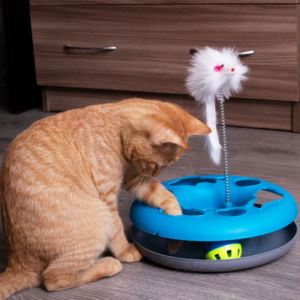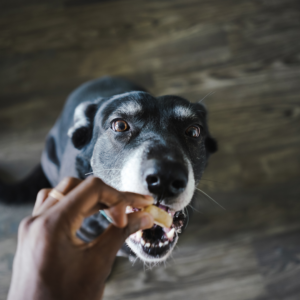Do Dogs Get The Winter Blues? - S.A.D Explained
Do Dogs Get The Winter Blues? - S.A.D Explained
Read more18 October 2023
With bonfire night (nights!) around the corner, how can we help our anxious pets cope with the flashes and bangs?
1. DO give lots of reassurance and cuddles!
Previously it was believed not to be a good idea to reassure your pet when they showed fear and anxiety. But these are emotions, and you will not be reinforcing this emotion you will be calming them down.
2. Provide distractions and games!

Licky mats, snuffle mats, puzzles, games, chews, and kongs are just some examples of items you can use to take your dog or cat’s mind off what is going on around them.
3. Provide exercise…
Do this during the day, not at night when your dog could be spooked by the fireworks! It doesn’t have to be a vigorous walk, but it does have to allow lots of sniffing! This can make them feel very relaxed and help them to settle in the evening.
4. Provide a litter tray…
Cats who are scared should be kept in overnight and many will choose to stay in. However, if they are anxious to go outside, they will hold on to their pee and poo. This in turn can cause problems, especially cystitis, a painful bladder inflammatory problem. They must be able to have somewhere to toilet inside.
5. Play some music!
Music can drown out the bangs. Classical, reggae, and soft rock are all good options. Do a trial and see which one your pet appears to enjoy!
There are noise cancelling headphones available for dogs, but they may not help. You would need to trial their use before the day.
6. Provide a safe space and hiding places…
A cardboard box with an entry hole can be a simple solution for cats and small dogs. Keep the curtains drawn and blinds pulled down. Make sure they have their familiar items around them such as their bed and favourite toy.
7. Try natural calming products… prior to the day!

Your vet will stock some herbal calming products. For cats catnip herb can help. For dogs chamomile can calm them. Chat with your vet and do a trial before the day to make sure they chill your pet out.
8. Speak to your vet about medications…
Gels, tablets, and solutions are all available to help with anxiety. These are aimed at controlling anxiety rather than just sedating them, which was the traditional method. Sedation often results in an animal who appears calm but is still acutely aware of what is going on but unable to react. Hence why antianxiety medication is the best option.
9. Keep the environment cool!
Stress can cause our dogs to pant. Extreme stress can cause cats to pant, you do need to seek vet advice if your cat is panting. Panting is also a method for dogs to lose heat. For our brachycephalic cats and dogs (the flat muzzled ones), overheating can be a problem, keep your room cool to help these animals if they are panting heavily as it can also put strain on respiratory structures and potentially the heart.
10. Be prepared…
Trial pheromone and calming sprays, thunder shirts, music, and herbal calming products prior to the event. Monitor how your pet responds. If your vet prescribes medication, discuss with them trialling this before the day also. Plan your days fitting in a good sniff walk, potentially feeding earlier in the day if the stress stops them from eating, and making sure the environment is cosy and feels safe.
Most of all remain calm and be there for your pet when they need you.
Most animals find fireworks to be extremely stressful and horses are no exception to this. For tips on helping your horse cope with fireworks click here.
Dr Sophie Bell, a Veterinary specialist, started working with British Pet Insurance in 2022 and continues to write for them on all things pet from a veterinary and medical point of view. Sophie is passionate about informing owners on how to keep their pets safe and happy.